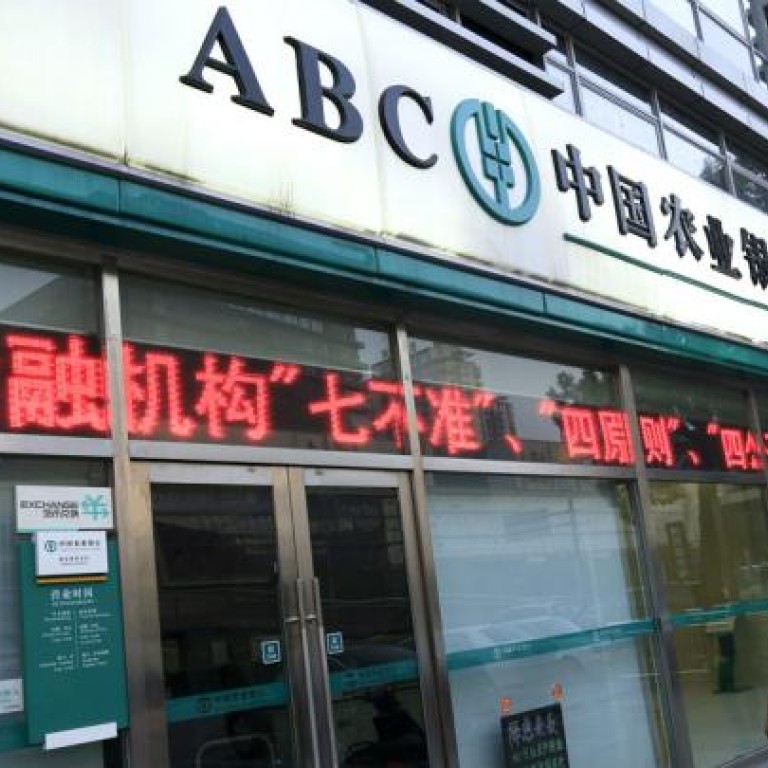
Selling credit risk to bank depositors is a lousy idea
Mainland banks pushing dangerous 'wealth management products' are gambling not only with savers' money but with economic stability
Three years ago in December 2009 warned it was a dangerous move for mainland banks to sell credit risk to their depositors.
Now they may be about to find out for themselves just how dangerous.
Hong Kong banks learned that after selling their customers Lehman Brothers mini-bonds.
The customers thought they were buying something akin to a deposit, only with a higher yield. What they were actually buying were structured notes with a value dependent on Lehman Brothers' credit-worthiness. When Lehman went bust, the value of the notes was wiped out completely.
Understandably aggrieved at losing their savings, the mini-bond holders blamed the banks for selling such garbage. They demanded their money back - and by kicking up a fuss they got most of it.
The lesson didn't register on the mainland. For the past five years banks there have been aggressively selling their customers things called "wealth management products".
These are presented as a zero risk alternative to savings deposits. Only instead of paying interest at 2.6 per cent like a three month deposit account, a 91 day wealth management product will typically pay around 5 per cent or more.
Not surprisingly, savers have proved eager buyers. Sales have ballooned, with ratings agency Fitch estimating the value of outstanding wealth management products will hit 13 trillion yuan (HK$16 trillion) by the end of this year.
To put that number into perspective, it's equal to a third of the value of mainland savings deposits, or almost a quarter of China's likely gross domestic product for this year.
Investors are happy to buy because they believe the products are backed by the banks that sell them. What they seldom realise is that their savings are actually going to fund loans made by third party finance companies, usually to high risk ventures with no access to formal bank lending. In other words, they are being sold concentrated credit risk.
Worse, while the wealth management products typically carry a tenor of three to six months, the underlying loans often have a much longer maturity.
That means the finance companies depend on issuing new products in order to repay the principal on their expiring notes, which of course is more or less how a Ponzi scheme works.
The danger comes if something happens to scare off investors. For example, an underlying borrower might default, leaving the finance company unable to pay out on the wealth management products it has issued.
As news spreads and the sales of new products flag, finance companies which had been relying on fresh income flows to repay the principal on their maturing notes will be forced to default in turn in a rapidly spreading domino effect.
There are concerns this may be about to happen. Earlier this week a crowd of irate investors besieged a Shanghai branch of Huaxia Bank after a wealth management product sold by the bank failed to pay out.
According to mainland media reports, a Henan businessman had siphoned off the proceeds of the note issue, which should have been lent to four companies, including two car dealerships, a pawn broker and a night club.
Huaxia denied responsibility, blaming a rogue employee it said had not been authorised to sell the wealth management product in question.
Whether or not that's true - and the "unauthorised employee" is often a kneejerk first defence in these sorts of cases - the excuse won't satisfy the bank's customers.
Like the buyers of Lehman mini-bonds, they bought the toxic investment on the bank's premises from a bank employee who very likely told them they stood little or no risk of losing money. As far as they are concerned, the bank is responsible and must make good their losses.
And if they kick up a big enough stink, the authorities may well order the bank to pay up. The last thing mainland officials want right now is a rash of protests outside the country's banks with hundreds of thousands of spooked savers demanding the immediate return of their cash.
In effect, this means China's banks could be forced to take 13 trillion yuan of high-risk assets on to their balance sheets, potentially knocking a nasty hole in their capital adequacy.
It's their own fault. They should have learned from Hong Kong.

